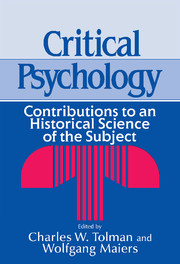Book contents
- Frontmatter
- Contents
- Preface
- Acknowledgments
- Contributors
- Critical Psychology
- 1 Critical Psychology: An Overview
- 2 Critical Psychology: Historical Background and Task
- 3 Societal and Individual Life Processes
- 4 Experience of Self and Scientific Objectivity
- 5 Psychoanalysis and Marxist Psychology
- 6 Emotion, Cognition, and Action Potence
- 7 Action Potence, Education, and Psychotherapy
- 8 Personality: Self-Actualization in Social Vacuums?
- 9 The Concept of Attitude
- 10 Client Interests and Possibilities in Psychotherapy
- 11 Play and Ontogenesis
- 12 Functions of the Private Sphere in Social Movements
- Bibliography
- Index
11 - Play and Ontogenesis
Published online by Cambridge University Press: 21 March 2010
- Frontmatter
- Contents
- Preface
- Acknowledgments
- Contributors
- Critical Psychology
- 1 Critical Psychology: An Overview
- 2 Critical Psychology: Historical Background and Task
- 3 Societal and Individual Life Processes
- 4 Experience of Self and Scientific Objectivity
- 5 Psychoanalysis and Marxist Psychology
- 6 Emotion, Cognition, and Action Potence
- 7 Action Potence, Education, and Psychotherapy
- 8 Personality: Self-Actualization in Social Vacuums?
- 9 The Concept of Attitude
- 10 Client Interests and Possibilities in Psychotherapy
- 11 Play and Ontogenesis
- 12 Functions of the Private Sphere in Social Movements
- Bibliography
- Index
Summary
For both historical and systematic reasons there have always been connections between psychology and pedagogy. So it is not surprising that Critical Psychology has, again and again, spoken of the implications of its concept of subjectivity for education and pedagogy. Until now, however, this has not been done systematically. This chapter represents an attempt to elaborate, in a three-staged argument, the reciprocal relationship between Critical Psychology and Critical Pedagogy.
In the first stage a pedagogical perspective on the theory of play based on the work of Friedrich Froebel is outlined, and guidelines for the assessment of theories of play are developed. It is also made clear that pedagogical science is an autonomous science and not a subdiscipline of psychology.
Then the theory and practice of a materialistic psychological theory of play is clarified in the context of a discussion of Elkonin's approach and a project directed by Feuser on the fostering of integrative play among handicapped and nonhandicapped children.
Finally, psychoanalytic approaches are considered, the critical discussion of which – against the background of the insights that we had acquired at the time – was a vital element in the development of Critical Psychological and Critical Pedagogical thinking.
Froebel's Educational Theory of Play
Certainly people have played since at least the time when societal production yielded a reliable surplus, but independent theoretical reflection has been given to this process only – at least in the European tradition – since the bourgeois revolution.
- Type
- Chapter
- Information
- Critical PsychologyContributions to an Historical Science of the Subject, pp. 212 - 233Publisher: Cambridge University PressPrint publication year: 1991



